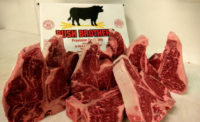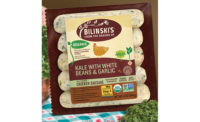A sausage for every niche




Sausages are known for more than their versatility and taste. They are also the medium for some of the most imaginative product development in the meat industry. Any major taste trend or consumer interest eventually makes its way to market in a sausage version. Healthier sausages, bison sausages, spicier sausages, sausages with all manner of inclusions — they are all readily available for the consumer who wants something a little different from the ordinary. Sausage companies have capitalized on this versatility to fill niches in the meat industry with their products.
Verde Farms has, for several years, specialized in grass-fed beef. The company has recently opened its own processing facility in Mullica Hill, N.J., to produce its high-end products in-house as well as provide processing services to other specialty meat companies. One of the company’s other recent initiatives was to launch a line of 100% grass-fed, 100% free-range, all-beef hot dogs and dinner sausages. Verde’s CEO, Dana Ehrlich, says the expansion was really a natural extension of its product line overall. Over time, the company’s product mix has expanded from premium raw steaks, ground beef and patties to include more “value-added” offerings.
“We know that consumers are increasingly interested in exploring bold flavors and culinary styles, but want to do so with products that are approachable and convenient while having transparent, simple ingredients,” he says.
Verde’s uncured hot dogs are available in both All Natural and Organic options. The sausages are available in three flavors: Hardwood Smoked, Hatch Green Chile and Cheddar, and Chorizo and Queso Fresco. Ehrlich says shoppers are looking for healthier alternatives to traditional favorites across all sectors, including the sausage category.
“A decade ago, you wouldn’t be seeing as many health claims like ‘natural’ and organic to draw in discerning shoppers, because there wasn’t as much of an expectation for an indulgent comfort food to meet particular wellness standards. Now, the expectation has rightly changed dramatically, and shoppers are much more attuned to health, responsible sourcing, and sustainability,” he adds. “To Verde, there’s no reason for consumers to sacrifice on exciting, crave-worthy flavor in order to choose something entirely wholesome, and our sausage varieties are a clear reflection of that.”
Tiefenthaler Quality Meats, located in Holstein, Iowa, had been a consistent award-winning participant at the Annual Cured Meat Championships, held each year at the American Association of Meat Processors annual convention. The company’s skinless wieners and sausages are favorites among the meat market’s clientele. Its No Mess Chili Dogs, which contain all the elements of a chili dog inside the wiener, are particularly popular. While the standard products are crowd pleasers, regular customers enjoy seeing and sampling new sausages.
Owner/operator John Tiefenthaler says that some of the more popular new sausage varieties he has introduced include a taco, a Philly style and a dill pickle and Swiss cheese sausage. The latter is a variation on a dried beef wrap, which features pickles and cream cheese wrapped inside pieces of dried beef and a tortilla.
Tiefenthaler Meats’ customers are always eager for new items, Tiefenthaler says.
“If we do samples and it’s a new product, we’re pushing the heck out of it, sample-wise, so it’s an opportunity for people to try it while they’re here.”
Tiefenthaler offers some advice for new product development. “Don’t come out with 10 new ideas one year and then nothing for the next,” he explains. “Save something in the holster for later.”
Staying consistent with product development can be a difficult process.
“We’ve added everything we can add to meat, I think, in this world,” Tiefenthaler notes. “How can you find something new? It seems like it’s impossible, but it becomes possible every day.”
Many sausage companies get a boost from being a local company in a supermarket meat case that is filled with national brands. Several years ago, Queen City Sausage Co., headquartered in Cincinnati, Ohio, rebranded its hot dogs as Cincinnati’s Hot Dog to great success.
Mark Balasa, director of marketing for Queen City Sausage, likens the appeal of locally made sausages to the prevalence of craft breweries. “People love the idea of sausages made in their hometown with the recipes, authenticity, and skill sets involved,” he says.
Though it competes against national brands, Queen City Sausage has not compromised its premium positioning to compete on price point.
“For us, the premium positioning was a natural place for us to be,” Balasa explains. “For the best ingredients, skills, old world processes that we do, we must charge more and people understand.”
Craft breweries helped to inspire a successful addition to the company’s line of hot sausages. Balasa explains that the company has seen continued interest in “hot” products. The company already had several hot sausages, including Hot Smoked Sausage and Hot Beef Smoked Sausage, but wanted something new without taking away from its established products.
“We wanted to grow the hot category without taking away from our established products,” he says. “We were inspired by the craft brewers who created fun and seasonal beers and gave the beers great names, almost personalities. Wicked came out of that thinking.”
The most popular product in the line is Wicked Ghost, followed by Wicked Jalapeno, Wicked Habanero, and Wicked Chipotle. Each variety is driven by the pepper. Balasa says the company set down a mandate for this product line.
“Each Wicked variety had to meet the following criteria: Allow the flavors of the pork and beef to come through. The hickory wood smoke and spices must be present and finally the pepper cannot overwhelm,” he explains. “Anyone can burn you up with hot, not Wicked. Wicked has magic, it allows all of the signature flavors to play nicely together with each bite.”
Looking for a reprint of this article?
From high-res PDFs to custom plaques, order your copy today!









